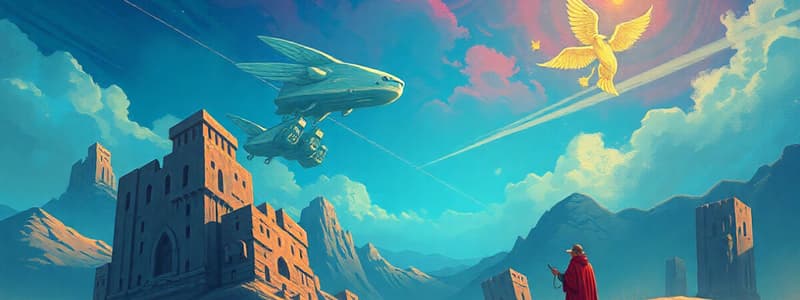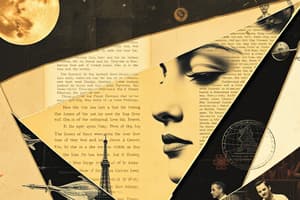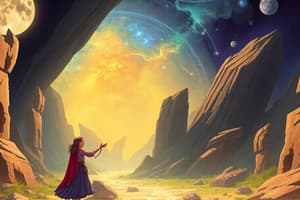Podcast
Questions and Answers
What is the Latin origin of the word literature?
What is the Latin origin of the word literature?
- Litera (correct)
- Litere
- Literare
- Literus
Which of the following is NOT one of the literary standards?
Which of the following is NOT one of the literary standards?
- Universality
- Simplicity (correct)
- Permanence
- Artistry
What aspect of literature does 'Intellectual Value' primarily enhance?
What aspect of literature does 'Intellectual Value' primarily enhance?
- Critical thinking (correct)
- Aesthetic appeal
- Emotional response
- Spiritual elevation
What ensures that literature possesses 'Permanence'?
What ensures that literature possesses 'Permanence'?
Which quality allows literature to evoke emotional responses through implied meanings and symbolisms?
Which quality allows literature to evoke emotional responses through implied meanings and symbolisms?
Why is a theme important in literary work?
Why is a theme important in literary work?
In what way should writers approach their chosen themes?
In what way should writers approach their chosen themes?
What is a fundamental characteristic required to engage audiences with literary works?
What is a fundamental characteristic required to engage audiences with literary works?
What is the primary focus of the analysis of formal elements in a text?
What is the primary focus of the analysis of formal elements in a text?
Which theory asserts that characters in a text reflect the author's psychological state?
Which theory asserts that characters in a text reflect the author's psychological state?
Postcolonial criticism primarily examines which of the following?
Postcolonial criticism primarily examines which of the following?
Queer theory challenges which assumption related to sexuality?
Queer theory challenges which assumption related to sexuality?
What does New Historicism assert about the influences on literature?
What does New Historicism assert about the influences on literature?
Which of the following best describes psychoanalytic criticism?
Which of the following best describes psychoanalytic criticism?
Which issues does queer theory primarily focus on?
Which issues does queer theory primarily focus on?
What does postcolonial criticism analyze regarding decolonized countries?
What does postcolonial criticism analyze regarding decolonized countries?
How does the theory presented in the content describe the relationship between literary criticism and the time period in which it occurs?
How does the theory presented in the content describe the relationship between literary criticism and the time period in which it occurs?
What distinguishes a paradox from an oxymoron?
What distinguishes a paradox from an oxymoron?
What does satire primarily aim to accomplish in literature?
What does satire primarily aim to accomplish in literature?
Which element allows an author to attribute human characteristics to non-human entities?
Which element allows an author to attribute human characteristics to non-human entities?
How does symbolism function within a narrative?
How does symbolism function within a narrative?
Which of the following best defines prose as mentioned in the content?
Which of the following best defines prose as mentioned in the content?
What is the main difference between a simile and a metaphor?
What is the main difference between a simile and a metaphor?
What literary device is described as a standalone statement that presents contradictory ideas?
What literary device is described as a standalone statement that presents contradictory ideas?
What is the primary characteristic of a fable?
What is the primary characteristic of a fable?
Which of the following best defines a tale?
Which of the following best defines a tale?
Which element is essential in fables but not necessarily in tales?
Which element is essential in fables but not necessarily in tales?
Which of the following is NOT a characteristic of a fable?
Which of the following is NOT a characteristic of a fable?
What typically distinguishes a tale from a fable?
What typically distinguishes a tale from a fable?
Which statement is accurate about the nature of narratives in literature?
Which statement is accurate about the nature of narratives in literature?
Why might someone argue that fables and tales serve different purposes in literature?
Why might someone argue that fables and tales serve different purposes in literature?
Which of the following distinctions is typically made when comparing fables and tales?
Which of the following distinctions is typically made when comparing fables and tales?
What was the primary reason the gods created Enkidu?
What was the primary reason the gods created Enkidu?
How did Enkidu's status change after he encountered the harlot?
How did Enkidu's status change after he encountered the harlot?
What action does Gilgamesh attempt before Enkidu confronts him?
What action does Gilgamesh attempt before Enkidu confronts him?
What happens to Enkidu after he becomes part of the human world?
What happens to Enkidu after he becomes part of the human world?
What effect does Enkidu's death have on Gilgamesh?
What effect does Enkidu's death have on Gilgamesh?
Flashcards are hidden until you start studying
Study Notes
Literature Overview
- Derived from the Latin word litera, meaning letter.
- Comprises oral, written, or visual forms that express human ideas, emotions, and experiences with universal significance.
Literary Standards
- Universality: Appeals to diverse cultures, races, genders, and eras.
- Artistry: Exhibits aesthetic qualities and beauty.
- Intellectual Value: Stimulates critical thinking and reveals fundamental life truths.
- Suggestiveness: Evokes emotions and meanings, highlighting deeper visions beyond reality.
- Spiritual Value: Inspires and motivates through moral lessons across genres.
- Permanence: Endures through time, with aspects of timeliness and timelessness.
- Style: Reflects unique ideas and forms through memorable expressions.
Qualities of Good Literature
- Theme: Central idea that guides the narrative, integrating various issues towards a cohesive message.
- Relevance: Engages audiences by linking themes to their everyday lives.
- Compelling Ideas: Keeps audiences invested with relatable and thought-provoking concepts.
- Form Analysis: Emphasizes the importance of structure, grammar, and style in uncovering true meanings.
Literary Criticism Theories
- Psychoanalytic Criticism: Connects literature to Freud's psychology, analyzing texts as reflections of authors' unconscious desires and anxieties.
- Postcolonial Criticism: Tackles the impacts of colonialism on culture, politics, and identity in literature, focusing on struggles for independence.
- Queer Theory: Examines representations of gender and sexuality, challenging heteronormativity and emphasizing the fluidity of sexual identity.
- New Historicism: Considers the historical context of both the author and the critic, suggesting that literature and criticism change over time.
Elements of Fiction
- Unknown elements listed that contribute to the structure and development of fictional narratives.
Literary Devices
- Oxymoron: Combines contradictory words, e.g., "bittersweet"; a two-word phrase.
- Paradox: Uses contradictory ideas to create a statement, often more complex.
- Personification: Attributes human traits to nonhuman entities, illustrating emotional depth.
- Satire: Critiques societal flaws through exaggeration and parody.
- Simile: Compares different things using "like" or "as" for clarity.
- Symbolism: Utilizes recurring elements to represent broader concepts, e.g., a ring symbolizing corruption in Lord of the Rings.
Forms of Literature
- Prose: Straightforward narrative form, resembling common speech, organized in paragraphs.
- Poetry: Expresses experiences artistically through sound and rhythm in verses.
Summary of Epic of Gilgamesh
- Introduces Enkidu, a wild man tamed by a prostitute, representing the transition to civilization.
- Enkidu challenges Gilgamesh, leading to friendship and adventures.
- The narrative explores themes of friendship, mortality (especially post-Enkidu's death), and the quest for knowledge and immortality.
Studying That Suits You
Use AI to generate personalized quizzes and flashcards to suit your learning preferences.




